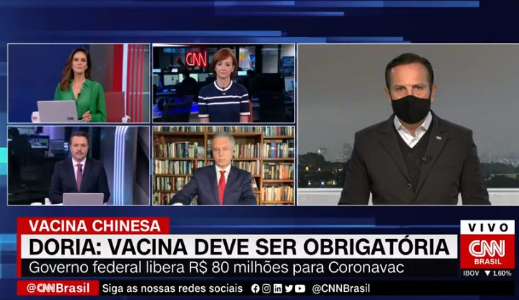RIO DE JANEIRO, BRAZIL – The COVID-19 vaccine ought to be obligatory for everyone, said São Paulo governor, João Doria, this week on a live CNN-Brazil interview, claiming that the Chinese COVID-19 vaccine currently in third-phase trials scheduled to conclude October 15 should be obligatory to all residents of the state.
Can he do that?
Well, there is disagreement from the highest levels. President Jair Bolsonaro, has said loudly “ninguém pode obrigar ninguém” — no one can force anyone to take a COVID-19 vaccine.

“I want to respectfully disagree with that position,” responded Doria. “The way I see it, a vaccine should be obligatory for all Brazilians. A vaccine has to be a personal decision for everyone, but an obligation, a determination of the state.”
But, can the state do that? Can it force you to take a vaccine? What do Brazil’s laws and constitution say? Who is right here?
In February this year, Bolsonaro himself signed a law dealing with the coronavirus emergency that among other things authorizes compulsory vaccination, along with the taking of clinical samples, laboratory tests, and medical exams.
That emergency law notwithstanding, however, Brazil has had legislation dating back to 1975 that makes vaccinations a duty subject to sanctions for noncompliance.
Brazilian Law No 6259, signed by then-president Ernesto Geisel and Health Minister José Carlos Seixas on October 30, 1975, in what is termed an Act of Epidemiologic Vigilance, establishes a National Immunization Program which stresses the obligation to be vaccinated and sets sanctions and punishments for enforcement.
In 2004, National Health Ministry Ordinance №597 regulated the law by establishing a national vaccination calendar, which in turn links the unimpeded use of government institutions, military enlistments, and government benefits to proof of vaccination.
So, these are the sanctions — if you refuse the vaccine you do not go to jail, but you do get your life made more difficult in dealing with various levels of government.
For those working in airports, ports, terminals, and border crossings, the Ministry of Health passed an ordinance in 2001 that makes vaccination specifically obligatory. Likewise, for those public transportation worlers in epidemic areas.
Parallel to all of this, the Brazilian Penal Code also establishes punishment for those who “violate the determination of the public power, aimed at preventing the introduction or spread of contagious disease.”
The penalty provided for in these cases is imprisonment from one month to one year and a fine. Punishments are higher for public health officials, doctors, pharmacists, dentists, or nurses.
As much as President Bolsonaro insists no one can enforce a vaccination, and as much as he refers to rights to freedom as provided for in the Constitution, the supremacy of public interest is enshrined in Brazilian jurisprudence.
According to the University of São Paulo Health Law Research Center, the state has police power under Administrative Law that seeks to guarantee social well-being and protect it from the abuse of individual rights or practices harmful to the community.
Still, Bolsonaro has a big megaphone in opposition to making vaccination compulsory.
“The logic of the individual right to choose whether to have a vaccine or not is tempting, since “I choose what is best for my health”. But the right to choose to wear a seat belt? What about building my house the way I want? What about giving my youngest son an alcoholic drink?” commented Davi Tangerino, Criminal Law professor at the Fundação Getúlio Vargas in a Twitter response to Bolsonaro’s comments.
“Public health is no different. Vaccines transcend individual choice; because they are (and when they are) scientifically recommended, my individual right to decide on my health gives way to the collective right to a measles-free environment, for example.”

